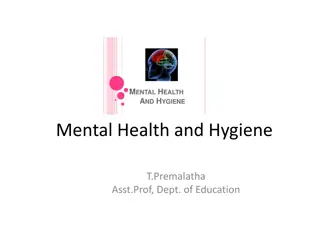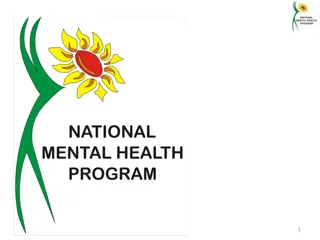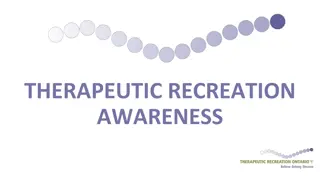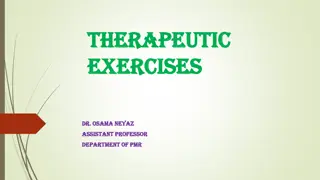Understanding the Therapeutic Power of Relationships in Mental Health
Explore the significance of using relationships as a therapeutic intervention in mental health care, focusing on universal relational needs, attachment theory, caregiver management of affect, and the role of non-verbal communication. Discover how relationships provide a foundation for healing and growth, emphasizing the importance of belonging, respect, support, and more in fostering secure attachments and buffering against trauma.
Download Presentation

Please find below an Image/Link to download the presentation.
The content on the website is provided AS IS for your information and personal use only. It may not be sold, licensed, or shared on other websites without obtaining consent from the author. Download presentation by click this link. If you encounter any issues during the download, it is possible that the publisher has removed the file from their server.
E N D
Presentation Transcript
Using the relationship as a therapeutic intervention Lance Metayer MS, LCMHC
Some Top Universal Relational Needs Belonging Respect Support Encouragement Approval Safety Acceptance Comfort Affection To Be Seen Appreciation
The Power of Relationships https://www.youtube.com/watch?v=NPW3ko6GoNE
Building the foundation: Attachment John Bowlby: Attachment is the lasting psychological connectedness between human beings. Infants are biologically prepared to form attachments with others because attachments help them survive A fundamental part of healthy development Secure Attachments can help buffer us against trauma
Attachment Building Blocks Caregiver Management of Affect Attunement Routines and Rituals Consistent Response Blaustein & Kinniburgh, 2010
Caregiver Management of Affect Non-verbal communication can be just as or more impactful than our verbal communication Children who are frequently scanning their environment tend to pay a lot of attention to non- verbal cues (facial expressions & other body language) Sometimes our body language may be experienced differently than we intended
http://image.slidesharecdn.com/classroombasicsturnarounds-100223102346-phpapp01/95/linking-swpbis-to-your-classroom-management-system-alan-robinson-23-728.jpg?cb=1350055128http://image.slidesharecdn.com/classroombasicsturnarounds-100223102346-phpapp01/95/linking-swpbis-to-your-classroom-management-system-alan-robinson-23-728.jpg?cb=1350055128 Management of Affect
Caregiver Management of Affect: Non-Verbal Management Be thoughtful about proximity and individual needs for space or closeness Control your voice (volume and tone) Do not force eye contact Control your body language Be thoughtful about location Use silence and relational distance and take a break if needed
Caregiver Management of Affect: Self-Regulation Children need support with learning how to identify, understand, and safely express emotions. The relationships we provide to them can serve as practice for the real thing. Trauma can significantly impact one s ability to regulate emotions and can shape attachment Secure relationships are a fundamental component of self- regulation "There is no more effective neurobiological intervention than a safe relationship" Bruce Perry, PhD, MD
Measuring Compassion Satisfaction & Compassion Fatigue: The Professional Quality of Life Scale (ProQOL) Compassion Fatigue ? A 30 item self-report measure of the positive and negative aspects of caring ? Measures Compassion Satisfaction and Compassion Fatigue ? Compassion Fatigue has two subscales ? Burnout ? Secondary Trauma Resiliency Planning ? Individual, personally ? The ProQOL can help you plan where to put your energy to increase our resilience ? Organizational planning ? Can help organizations find ways to maximize the positive aspects and reduce the negative aspects of helping ? Supportive Supervision ? The ProQOL can be used as information for discussions
Attunement The ability to read and appropriately respond to emotional cues A subjective experience of being felt by another. Focused attention bringing another into our internal world (Sigel, 2010) In order to accurately attune, we must listen for the emotional experience underneath the behavior Escalation Cycle 8,11
Attunement: Responsive Listening Short, descriptive, empathic statements (we are not yet analyzing, problem solving or repairing- we are focusing on soothing and calming) Processing statements: I am noticing .. Mirroring/Paraphrasing: I hear you saying... Respectful curiousity: I am wondering if . Self Reflection/Modeling: I am feeling How we say this, will be just as important as the content of what we say
Attunement: Responsive Listening Skills Acknowledging Apologizing Agreeing Inviting criticism
Consistent Response Caregivers responses and the environment are predictable Rules and limits are clear We can be consistent without being overly rigid Children who have endured trauma may initially resist imposed structures and rules due to survival mechanisms
Routines and Rituals Predictable routines increase sense of safety Children can focus less on survival and more on healthy development Repetition is an important way that all people gain skill; we gain skill more easily through predictable structures The invisible bookends that bracket our days (Blaustein & Kinniburgh, 2010)
De-escalation and emotional support to a youth in distress Connect, Then Redirect -Dan Siegel
Connection Strategies Validate Emotions: We can validate emotions and not like the behavior. Name it to tame it. It makes sense to me that you feel . That sounds so frustrating Reflect what you hear. This communicates comfort and allows the child to feel heard It sounds like you were feeling overwhelmed . is that right ? Can you help me to understand what was going on; it sounds like ?
Why Connect First? Short-term benefit: It moves the youth from reactivity to receptivity. Long-term benefit: It builds a youth's brain. Relational benefit: It deepens your relationship with the youth. From: CONNECT AND REDIRECT REFRIGERATOR SHEET No-Drama Discipline by Daniel J. Siegel and TinaPayne Bryson
Then, Redirect When the youth is ready, we can then engage the problem solving and processing part of the brain: the thinking brain . - Inquire to increase insight and understanding: I wonder how you were feeling when ? I wonder what was happening for you? Problem Solve: What might help next time? Let s practice these skills together. Redirection is our opportunity to teach skills Relational Repair Work If Needed























